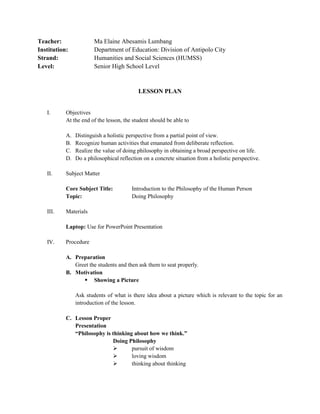
Lesson Plan in Introduction to Philosophy
- 1. Teacher: Ma Elaine Abesamis Lumbang Institution: Department of Education: Division of Antipolo City Strand: Humanities and Social Sciences (HUMSS) Level: Senior High School Level LESSON PLAN I. Objectives At the end of the lesson, the student should be able to A. Distinguish a holistic perspective from a partial point of view. B. Recognize human activities that emanated from deliberate reflection. C. Realize the value of doing philosophy in obtaining a broad perspective on life. D. Do a philosophical reflection on a concrete situation from a holistic perspective. II. Subject Matter Core Subject Title: Introduction to the Philosophy of the Human Person Topic: Doing Philosophy III. Materials Laptop: Use for PowerPoint Presentation IV. Procedure A. Preparation Greet the students and then ask them to seat properly. B. Motivation Showing a Picture Ask students of what is there idea about a picture which is relevant to the topic for an introduction of the lesson. C. Lesson Proper Presentation “Philosophy is thinking about how we think.” Doing Philosophy pursuit of wisdom loving wisdom thinking about thinking
- 2. Philosophy is different from: opinion point of view preference ideology belief advocacy The motivation of philosophy derives from uneasiness with the status quo. Like: “The opinion of a thousand jackasses is just that: the opinion of a thousand jackasses.” A basic pre-requisite for doing philosophy: An OPEN MIND uncluttered in so far as possible by pre-conceived or pre- determined parameters. Basic tool of Philosophical Research: Critical reason/ Logic Language Three basic procedures in doing philosophy: o Analysis- Clarification of thoughts, concepts, and the meaning of language. o Criticism- Evaluate basic alternative modes of life and thought and formulate choices. o Speculation- Construct ideal features of projections of desirable experiences. Basic way of Doing Philosophy: ARGUMENT “An argument is a connected series of statements intended to establish a definite proposition.” ---Monty Python ARGUMENT AND NON ARGUMENTS Example: Every scene of this movie was filled with excitement for me. I particularly liked the action scenes on the river. NOT ARGUMENT- Expression of support/enthusiasm Example: I spent thousands to take this course and the professor appeared in blue jeans and tee shirt, which I consider bad taste. He may have known what he was talking about, but I couldn’t get past the clothes. NOT ARGUMENT- A complaint/grip
- 3. Example: The sincerest satisfaction in life comes in doing one’s duty and in being a dependable person. NOT ARGUMENT- A statement of Point of View Example: “He that hath wife and children hath given hostages to fortune; for they are impediments to great enterprises, either of virtue or mischief.”- Francis Bacon NOT ARGUMENT- Elaborated, but unsupported statement of opinion. Example: “Women have great strengths, but they are strengths to help the man. A woman’s primary purpose in life and marriage is to help her husband succeed.”- James Robinson NOT ARGUMENT- Elaborated, but unsupported statement of opinion. Basic ingredients of an argument: 1. Proposition – statement of assertion that is either true or false A proposition can either be: A Premise, or A Conclusion A first step toward understanding arguments is learning to identify premises and conclusions. Unfortunately, they are not always explicit. GIGO – In a basic deductive argument if a premise is false, so is everything else “Garbage In….. ……Garbage Out.” Validity and Soundness of Arguments An argument is valid if its conclusions follow necessarily from its premises. A sound argument has true premises and true conclusions. Example: All men are mortal Socrates is a man. Socrates is a mortal. Premises are true, inference is valid; this argument is both valid and sound.
- 4. Example: All cats are animals. All pigs are animals. All pigs are cats. Premises are true, but improper inference; not a sound argument Example: All movie stars live in Hollywood. Robert Redford is a movie star. Therefore Robert Redford Lives in Hollywood. False premise, but valid reasoning, a valid argument, but not a sound argument. Primary ways to examine/take issue with deductive arguments: 1. Is there indeed an argument? 2. Does conclusion necessarily follow from premises? Is this the only logical conclusion possible from these premises? 3. Are the premises indeed true? Inductive arguments 1. Reason from the particular to the general. 2. Evaluated in terms of “inductive force” or probability rather than soundness per se. “Philosophy is both a body of knowledge (history of ideas) and an on-going, systematic method of inquiry.” Engagement with both relies essentially upon argument. By means of analyses based on arguments, philosophers can do experiments: thought experiments, where variables are manipulated in imagination rather than in laboratories or in field work. A process of systematic inquiry by which data are gathered, analysed, and interpreted in ways that contribute to the development of knowledge. The data of philosophical research are ideas, concepts, and explanatory constructs. Philosophers inspect the architecture of such cognitive units, asking “how do we know what we know?” and “Why?” Philosophers are all about construct validity.